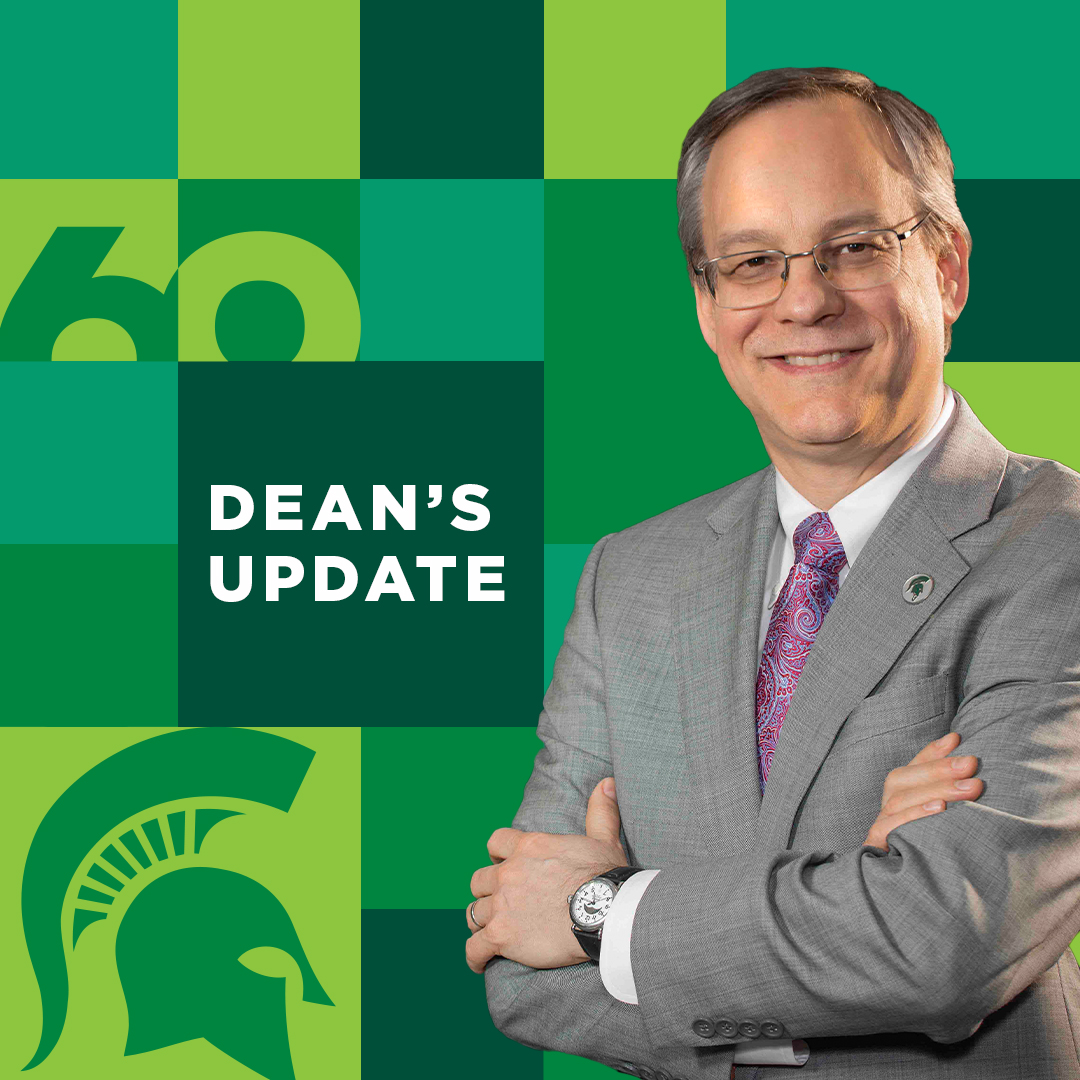Dean's Update
December 13, 2024 - Aron Sousa, MD

Friends,
This week, I was in Midland to celebrate our 60th Anniversary in our final community town hall event of the College of Human Medicine Era Tour 2024. It’s taken time and effort, but it has been a great tour of the state, and before you just shake it off as some kind of deanly hyperbole, it has been a great delight to talk with our students, staff, faculty, and community partners about a happy version of the story of us and the work our people do now. I’ve written about these town halls often enough that you know about them all too well. My thanks to Melissa Kacos, Mark Brieve, Jordan Stine, and the whole traveling team for the success of these visits. It has been a joy to hear from alumni and students about their experiences at the college, and a fresh reminder of the great collaborations we have with community partners.
This week also marks the nominal end of the Health Sciences Council, which has been meeting since summer to provide President Guskiewicz organizational options for the health sciences. The president will get the draft report this week, and we are expecting next steps in the new year. The council has been a great group to work with, and I particularly appreciate the co-chairs, Jeff MacKeigan, PhD, and Joyce deJong, DO, who have herded the cats and pushed the work forward.
As the month progresses, we are rapidly approaching the first steps of our clinical integration with Henry Ford Health System. While our clinical practice is nowhere as large as theirs, Michigan State University is a $3.6 billion constitutional institution known around the world. The university has some amazing people working in health as researchers, clinicians, and teachers, but we lack the clinical scope and scale to be recognized for that excellence. Clinical integration with Henry Ford provides us that scope and scale. For their part, Henry Ford has amazing people, but without a university structure, they cannot be recognized for and recruit to much of their excellence. We each must compromise to make our partnership greater than the sum of the parts.
Some of this has already happened in research. Much of the research happening now at Henry Ford is within Michigan State structures, and our Departments of Obstetrics, Gynecology and Reproductive Biology and our Department of Anesthesia have brought parts of Henry Ford into the university. That will happen more as the next departments (dermatology, neurosurgery, otolaryngology, pathology, radiation oncology, and urology) are implemented. This has been an adjustment for Henry Ford researchers, and the new clinical integration will be an adjustment for our clinicians.
I want to be clear; our faculty will all remain employees of the departments, the colleges, and the university. That said, the clinics will be run on Henry Ford protocols and structures. The partnership will bring a new electronic health record, better payment for some services, and improvements in central clinical services. While nine joint work groups have been solving problems for the last six months, it is not possible to preemptively solve all problems. When we do not know our next step, the current Joint Operating Council of Henry Ford and Michigan State leaders will work out the solution.
While the agreement brings significant financial benefit to our faculty and departments as a group, we will still have to address parts of our program with large financial struggles. Our economic problem is not our people. Our clinicians and staff work very hard, see lots of patients, and demonstrate their productivity. However, we do not have access to the downstream revenue of hospitals that prop-up the finances of other clinical groups. In addition, some of our specialists have been hurt by changes in referral patterns as other groups have joined hospitals, hospitals have been taken over by outside entities, and private equity has purchased previously independent groups that referred to us. The existing network of Henry Ford practices and their clinically integrated network will help us solve some of these problems.
Not all our issues will be solved by downstream revenue and better networks. There are some services we no longer have the funding to support, and we need to find other solutions. I am not happy about this, and I have used college reserves to find better solutions. The college has been working for months with these teams to find resolutions and next steps. All involved know the work before us.
This is always a busy time of the year, and the submission deadline for the 1964 Project proposals is December 15. We hired our first faculty member in the 1964 program this semester, and I am looking forward to our next hires!
This week the semester ends, fittingly, with graduation, the best day on the campus. Our fall MPH, MS, and PhD graduates will be celebrated during the advanced degree commencement celebration at the Breslin on Friday afternoon. I will have the chance to get up on stage and celebrate our amazing graduates, who are ready to go into the world to make communities and people healthier through the power of science.
Serving the people with you,
Aron
Aron Sousa, MD, FACP
Dean, Michigan State University College of Human Medicine

